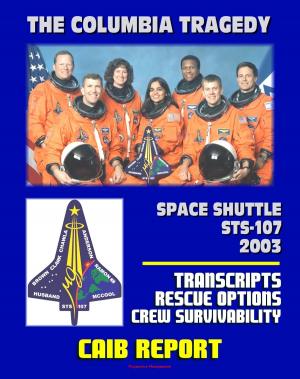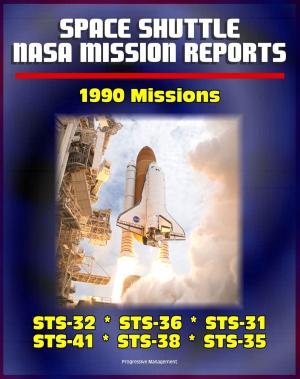Apollo and America's Moon Landing Program: NASA Recommendations to Space-Faring Entities - How to Protect and Preserve the Historic and Scientific Value of U.S. Government Lunar Artifacts
Nonfiction, Science & Nature, Technology, Aeronautics & Astronautics, Science, Physics, Astrophysics & Space Science| Author: | Progressive Management | ISBN: | 9781311952653 |
| Publisher: | Progressive Management | Publication: | September 5, 2014 |
| Imprint: | Smashwords Edition | Language: | English |
| Author: | Progressive Management |
| ISBN: | 9781311952653 |
| Publisher: | Progressive Management |
| Publication: | September 5, 2014 |
| Imprint: | Smashwords Edition |
| Language: | English |
NASA recognizes the steadily increasing technical capabilities of space-faring commercial entities and nations throughout the world and further recognizes that many are on the verge of landing spacecraft on the surface of the moon. Representatives of commercial entities have contacted NASA seeking guidance for approaching U.S. Government (USG) space assets on the lunar surface - out of respect for hardware ownership, and a sincere desire to protect general scientific and historic aspects of these sites. Because there is no precedent for this situation throughout nearly 50 years of spaceflight, there are no USG guidelines or requirements for spacecraft visiting the areas of existing USG-owned lunar hardware regardless of condition or location.
Fortunately, there are several lunar experts across NASA and the scientific, historical, legal, materials, and flight-planning communities who can provide some initial guidance for these lunar endeavors. NASA has performed recent propellant/plume and lunar regolith impingement analyses and initiated a science evaluation that examined the risks and concerns of damage to the heritage Apollo landing sites resulting from future spacecraft descent/landing and associated surface and low-altitude flight mobility. From a scientific perspective, many sites are still active (e.g., Apollo retro-reflectors), and continue to produce material, biological, and physical scientific data associated with long-term exposure of human-created systems (e.g., witness plates) to the lunar environment. NASA has also considered impacts to non-Apollo USG lunar artifacts.
Until more formal USG guidance is developed and perhaps a multilateral approach is developed to reflect various nations' views on lunar hardware of scientific and historic value, NASA has assembled this document that contains the collected technical knowledge of its personnel - with advice from external experts and potential space-faring entities - and provides interim recommendations for lunar vehicle design and mission planning teams. As such, this document does not represent mandatory USG or international requirements; rather, it is offered to inform lunar spacecraft mission planners interested in helping preserve and protect lunar historic artifacts and potential science opportunities for future missions.
NASA recognizes the steadily increasing technical capabilities of space-faring commercial entities and nations throughout the world and further recognizes that many are on the verge of landing spacecraft on the surface of the moon. Representatives of commercial entities have contacted NASA seeking guidance for approaching U.S. Government (USG) space assets on the lunar surface - out of respect for hardware ownership, and a sincere desire to protect general scientific and historic aspects of these sites. Because there is no precedent for this situation throughout nearly 50 years of spaceflight, there are no USG guidelines or requirements for spacecraft visiting the areas of existing USG-owned lunar hardware regardless of condition or location.
Fortunately, there are several lunar experts across NASA and the scientific, historical, legal, materials, and flight-planning communities who can provide some initial guidance for these lunar endeavors. NASA has performed recent propellant/plume and lunar regolith impingement analyses and initiated a science evaluation that examined the risks and concerns of damage to the heritage Apollo landing sites resulting from future spacecraft descent/landing and associated surface and low-altitude flight mobility. From a scientific perspective, many sites are still active (e.g., Apollo retro-reflectors), and continue to produce material, biological, and physical scientific data associated with long-term exposure of human-created systems (e.g., witness plates) to the lunar environment. NASA has also considered impacts to non-Apollo USG lunar artifacts.
Until more formal USG guidance is developed and perhaps a multilateral approach is developed to reflect various nations' views on lunar hardware of scientific and historic value, NASA has assembled this document that contains the collected technical knowledge of its personnel - with advice from external experts and potential space-faring entities - and provides interim recommendations for lunar vehicle design and mission planning teams. As such, this document does not represent mandatory USG or international requirements; rather, it is offered to inform lunar spacecraft mission planners interested in helping preserve and protect lunar historic artifacts and potential science opportunities for future missions.















